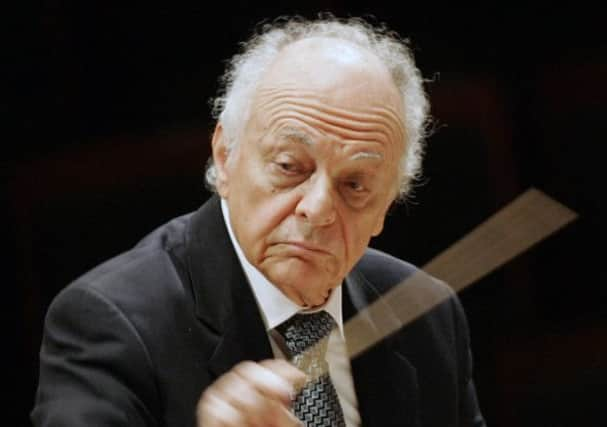Obituary: Lorin Maazel, conductor and composer


LORIN Maazel was a child prodigy who became a driving force in music throughout the world: he was a musical titan whose control over orchestras and singers was total. On the podium or in the pit, he ruled with a cool, all-pervading technical brilliance.
He was a controversial figure and didn’t suffer fools gladly. Musicians either admired him or avoided him. But this glamorous maestro became music director of three of the leading orchestras in the world – the New York Philharmonic, the Pittsburgh Symphony and the Cleveland Orchestra – and musical director of the Vienna State Opera. He was a man of much intellectual strength – speaking six languages fluently – and had a legendary memory for the most complex score.
Advertisement
Hide AdAdvertisement
Hide AdScotland was fortunate to welcome Maazel to several Edinburgh Festivals. His first – for a particularly prestigious opening concert with the London Symphony Orchestra – was to conduct Beethoven’s Missa Solemnis with the fiery Russian soprano Galina Vishnevskaya. She arrived at Edinburgh for rehearsals with Maazel with, what the festival director George Harewood, politely described in his memoirs, “a very inaccurate idea of the score. Maazel restrained his indignation in the interests of international accord.” Tension further mounted when Maazel had to devote much of the rehearsal time to his soprano and little to the other soloists. Harewood concluded: “Vishnevskaya then proceeded to steal all the honours at the performance with a nearly flawless display.”
The next night, Maazel conducted Shostakovich’s cello concerto played by Mstislav Rostropovich – Vishnevskaya’s husband. The next year he was in charge of the BBC Symphony Orchestra playing Bartok’s piano concerto with John Ogdon and in 1964 he returned with the National French Radio Orchestra for a rousing concert performance of Berlioz’s Romeo et Juliette.
In 1985, Maazel led the Pittsburgh Symphony in two thrilling concerts – the first included an outstanding account of Berlioz’s Symphonie Fantastique and in 1987 he conducted the same forces in Beethoven’s Choral Symphony and the following night Hindemith’s Mathis der Maler.
Lorin Varencove Maazel was the son of American music students who were studying in Paris. He showed an early aptitude for music and, after the family moved to Los Angeles when he was five, he studied the piano and violin. It was the latter at which he became hugely proficient. He studied conducting and by 11 he had conducted the NBC Symphony. Along with his musical studies Maazel read mathematics, languages and philosophy at Pittsburgh University. In 1951, he was given a Fulbright scholarship to study Baroque music in Italy and aged 30 he became the youngest conductor to conduct at Bayreuth. In 1965, he was appointed music director of the Deutsche Oper, Berlin.
Maazel also held important posts in the United States. In 1972, he was made music director of the Cleveland Orchestra, where he masterminded the first complete recording of Porgy and Bess. His time at Cleveland was not without its problems: with typical candour Maazel once said, “the relationship remained more or less rocky to the end”.
From 1982-84 he was principal conductor of the Vienna State Opera – again, not an altogether happy period – but he became closely associated with the famous New Year’s Day concert, which he first conducted in 1980 and returned frequently – often playing the violin and conducting. From 1984-1996 Maazel was associated with the Pittsburgh Symphony Orchestra. He conducted in London – principally with the Philharmonia and once conducted, in one day, all nine Beethoven symphonies at the Festival Hall. From 2002 he was director of the New York Philharmonic featuring John Adams’s challenging memorial to the victims of 9/11, On the Transmigration of Souls, in his first season
Maazel also built a healthy reputation as a fine conductor for operas on film – understanding the different, but very demanding, techniques. His most famous films were Joseph Losey’s Don Giovanni (1979) with Ruggero Raimondi, Carmen (1984) with Placido Domingo and Zefferelli’s much-cut Otello (1986) again with Domingo. He came to London’s Royal Opera only twice. First in 1978 for a new production of Verdi’s Luisa Miller with Luciano Pavarotti and Katia Ricciarelli, then in 2005 for a production of his own opera, 1984, based on the Orwell novel.
But for many it was his prodigious recordings that will be Maazel’s lasting testimony. Apart from the classics, he brought a new freshness and vitality to the works of Puccini, Sibelius, Tchaikovsky, Richard Strauss and Mahler.
Advertisement
Hide AdAdvertisement
Hide AdRecently, he devoted much time to the Castleton Festival at his home in Virginia in the US, where he coached young students. Earlier this year Maazel said working with the young was “more than a labour of love – it was a labour of joy”.
Maazel’s third wife, Dietlinde, and their two sons and daughter survive him, along with a son and three daughters from previous marriages.